SacriFire combines Vagrant Story's combat with Octopath Traveler's gorgeous graphics
We talk to the developers of this JRPG with a modern twist and awesome set of inspirations.
I love JRPGs, but I'm not blind to the genre's biggest problems.
Forever stuck in the shadow of defied SNES and PlayStation classics, a lot of JRPGs are too hokey, repetitive, and about 40 hours too long. But when SacriFire's project lead Bartosz Łojewski told me his biggest inspiration was Vagrant Story, that caught my attention. Created by Yasumi Matsuno, who also made Final Fantasy Tactics and Final Fantasy 12, Vagrant Story is cherished as one of the most subversive and stylish JRPGs ever. Back when it released in 2000, Vagrant Story bucked all of the genre's worst tropes. And that's exactly what SacriFire aims to do.
Announced at the PC Gaming Show, SacriFire is a "JRPG-inspired" game that will release (hopefully) late next year. The Kickstarter campaign to help fund it just went live and is being made by a small team based out of Poland notable for a previous Kickstarter RPG success with Regalia: Of Men and Monarchs. This time, though, developer Pixelated Milk is creating something much more ambitious.
Vagrant Story is not a game that can easily be replicated. Its cinematics were Kojima-esque in the way they drew inspiration from films, and the story bucked the grandiose plots of other JRPGs for something intimate and intense. SacriFire doesn't replicate those stylistic elements—not in what I saw, at least—but it does channel Vagrant Story's excellent combat and RPG systems. The trailer showcases some lovely pixel art set in a 3D world (think Octopath Traveller) and the game's music is composed by Motoi Sakuraba, who orchestrated the soundtracks to dozens of legendary RPGs like Dark Souls and the Tales series. Ahead of the PC Gaming Show, I got a chance to sit down with project lead Bartosz Łojewski to talk about SacriFire's inspirations and vision.
Death to turn-based
SacriFire won't force you to grind, has a main story that's somewhere around "20 to 30 hours long," and features a dynamic combat system.
When I first started talking with Łojewski, he wanted to make one thing very clear: SacriFire is a "JRPG-inspired game" not a JRPG. For one, the development team is based in Poland—so that would technically make it a PRPG—but more importantly SacriFire aims to blend the sensibilities of Japanese and western RPGs to create an experience that evokes those childhood classics without being weighed down by the unnecessary baggage of the genre.
Łojewski makes that clear from the beginning: SacriFire won't force you to grind, has a main story that's somewhere around "20 to 30 hours long," and features a dynamic combat system that Łojewski hopes will be a lot more exciting than turn-based battles against the same enemies again and again.
"We are very proud of our combat system," Łojewski says, "which is like the lifeblood of every JRPG. It blends action and turn-based elements. In a traditional JRPG, you would expect a fully turn-based system, like in Final Fantasy, or action-based combat, like in Star Ocean, but in our game we blend those together. We allow the player free movement around the battlefield, we give the player the ability to dodge attacks and be very reactive, but there's also this active pause, it's basically a system where you can pause the game and do stuff in a more turn-based fashion."
Keep up to date with the most important stories and the best deals, as picked by the PC Gamer team.
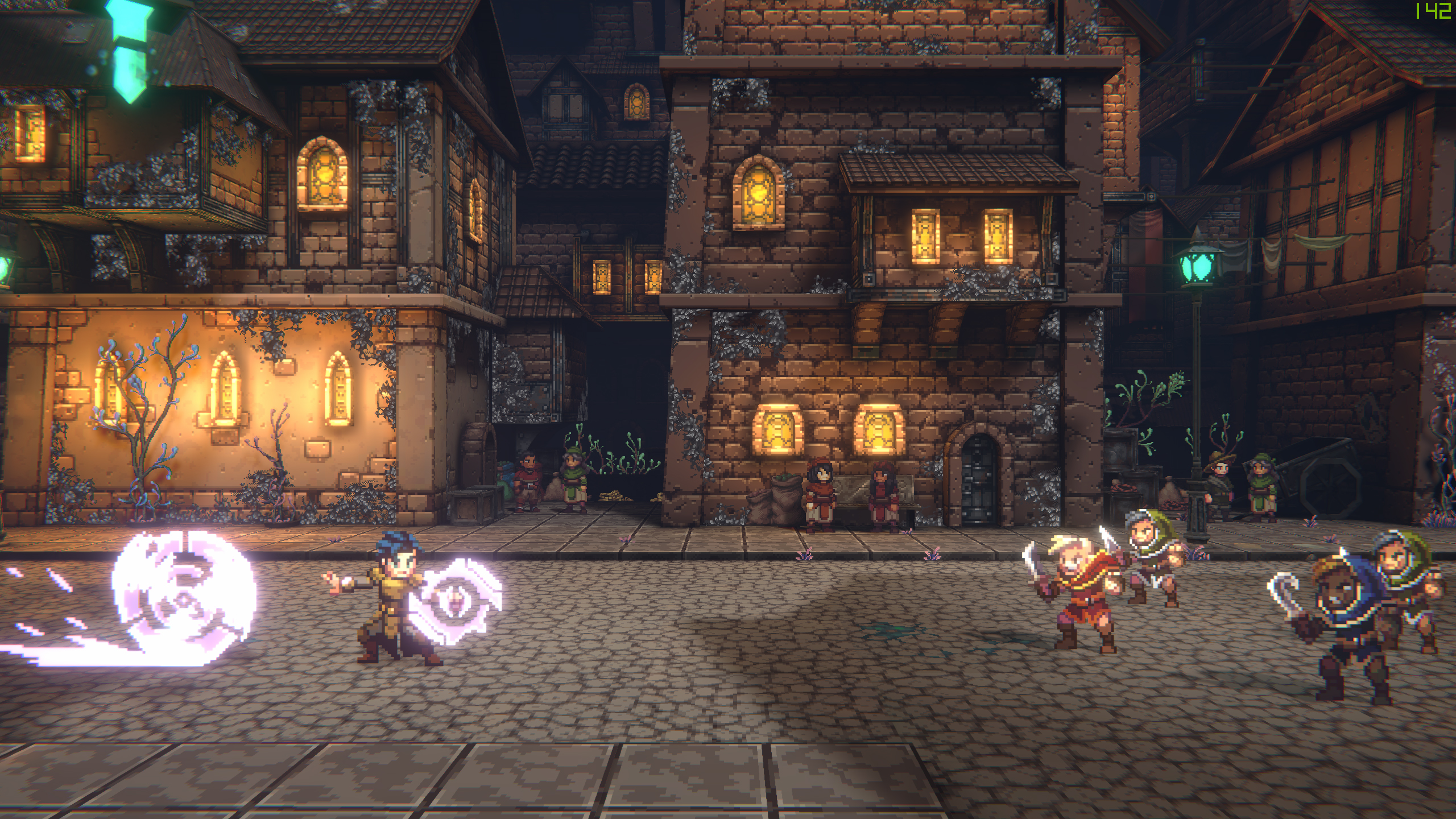
This is where Vagrant Story's influence is the strongest. Instead of locking the player into one playstyle, the combat system is designed to reward players for being adaptable and thinking strategically. Like Vagrant Story, the trick is to exploit enemy weaknesses against certain elements and damage types. The main character doesn't fight with conventional weapons, but has something called a Divos gauntlet that basically materializes a bunch of different weapon types that each have their own strengths and weaknesses. You can switch between these at will.
What's unique though is that you're not just going to be spamming the same few attacks again and again like in most JRPGs. SacriFire has a system where you string different attacks together to create powerful combos specifically tailored for each enemy and its unique weaknesses. "Every encounter is different in that way," Łojewski tells me. "You cannot really spam the same attack mindlessly. You always have to keep in mind what enemy you are facing, what weapons and skills you have, and you have to tailor that to the enemy you're fighting."
You'll need to be thinking about what body parts should I damage, what should I break, what weapons should I have on me?
Bartosz Łojewski
One of my favorite features of Vagrant Story's combat is being able to target certain body parts on enemies to inflict certain status effects. Punch a boss in the head enough, and you might blind them temporarily for example. That system is present here, too, though it's something that's more prominent in boss battles. "But if you're in a boss fight with a lot of difficulty, you'll need to be thinking about what body parts should I damage, what should I break, what weapons should I have on me?"
That all sounds cool, but I feel a little silly that what really excites me is that SacriFire won't have random battle encounters like the early Final Fantasy games, and combat won't be a way to pad out the main story by jamming a few hundred battles in between major story beats.
Two worlds
Combat is only one side of the JRPG coin, though. And while it's hard to get a sense of SacriFire's story from just an interview, I am very intrigued by its premise. The whole game is set in an underground city full of people that have no idea what the outside world is like. Perhaps the most JRPG thing about the story is that the character is a religious knight for a church that rules over the underground city of Antioch.
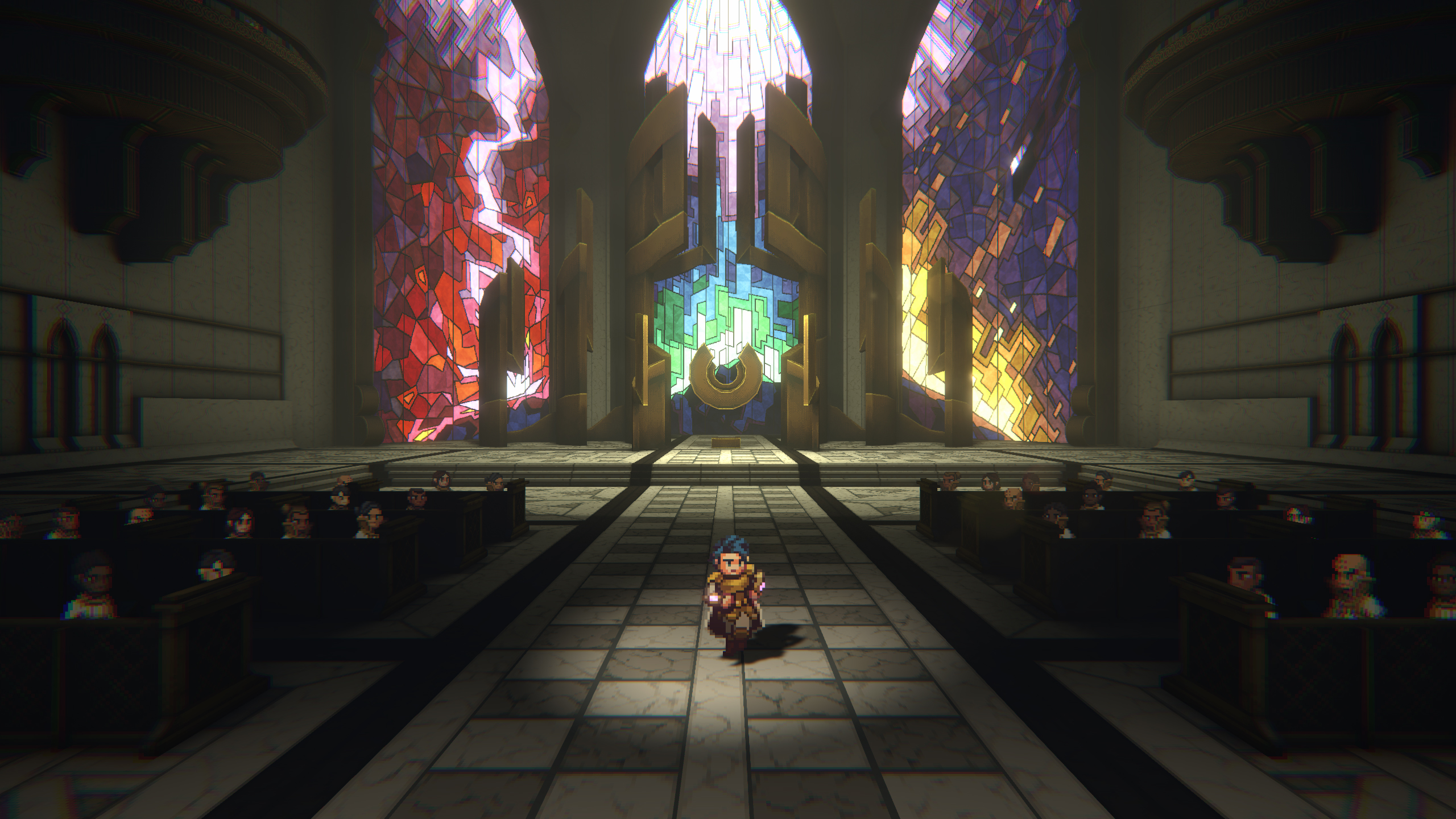
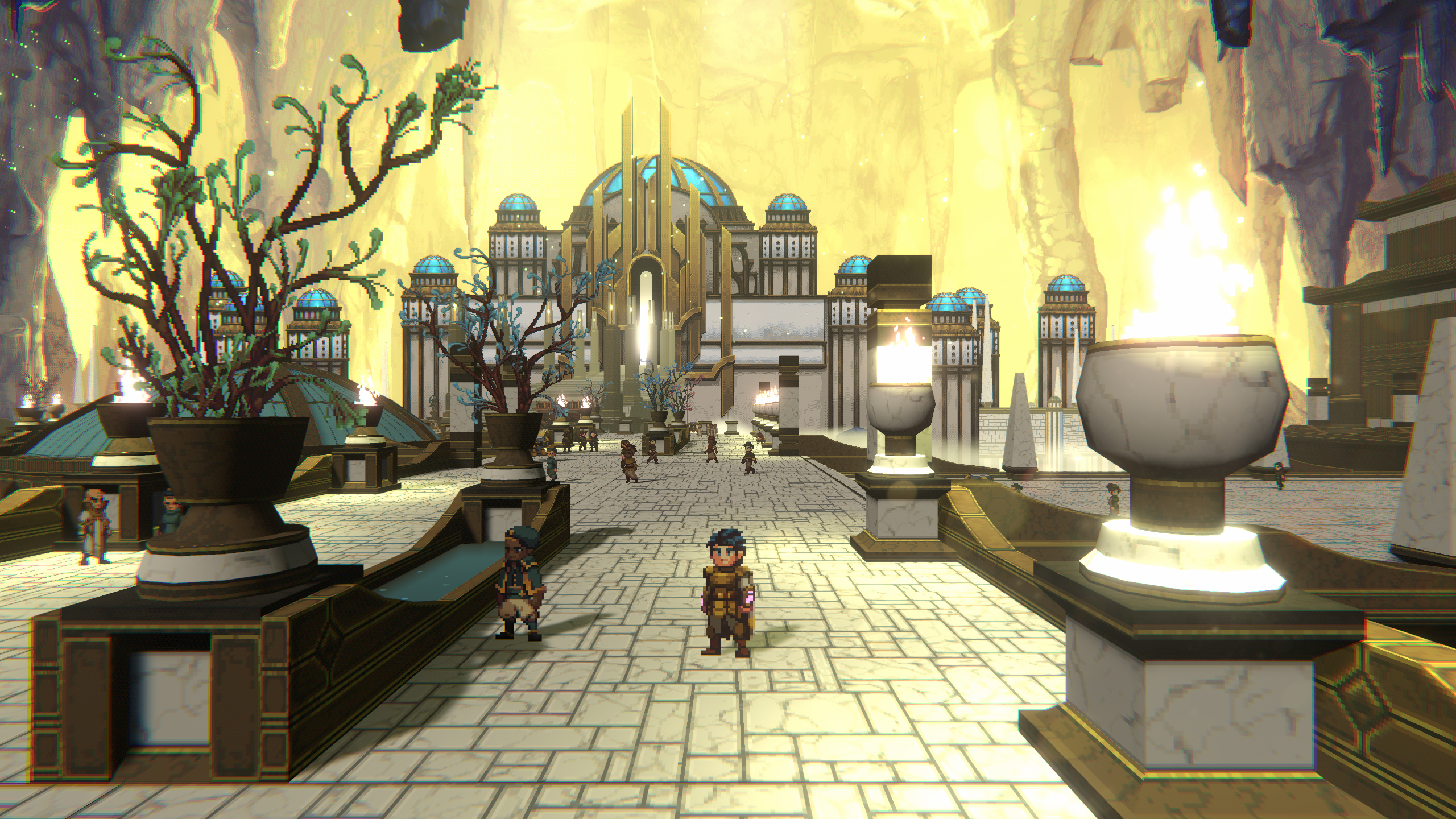
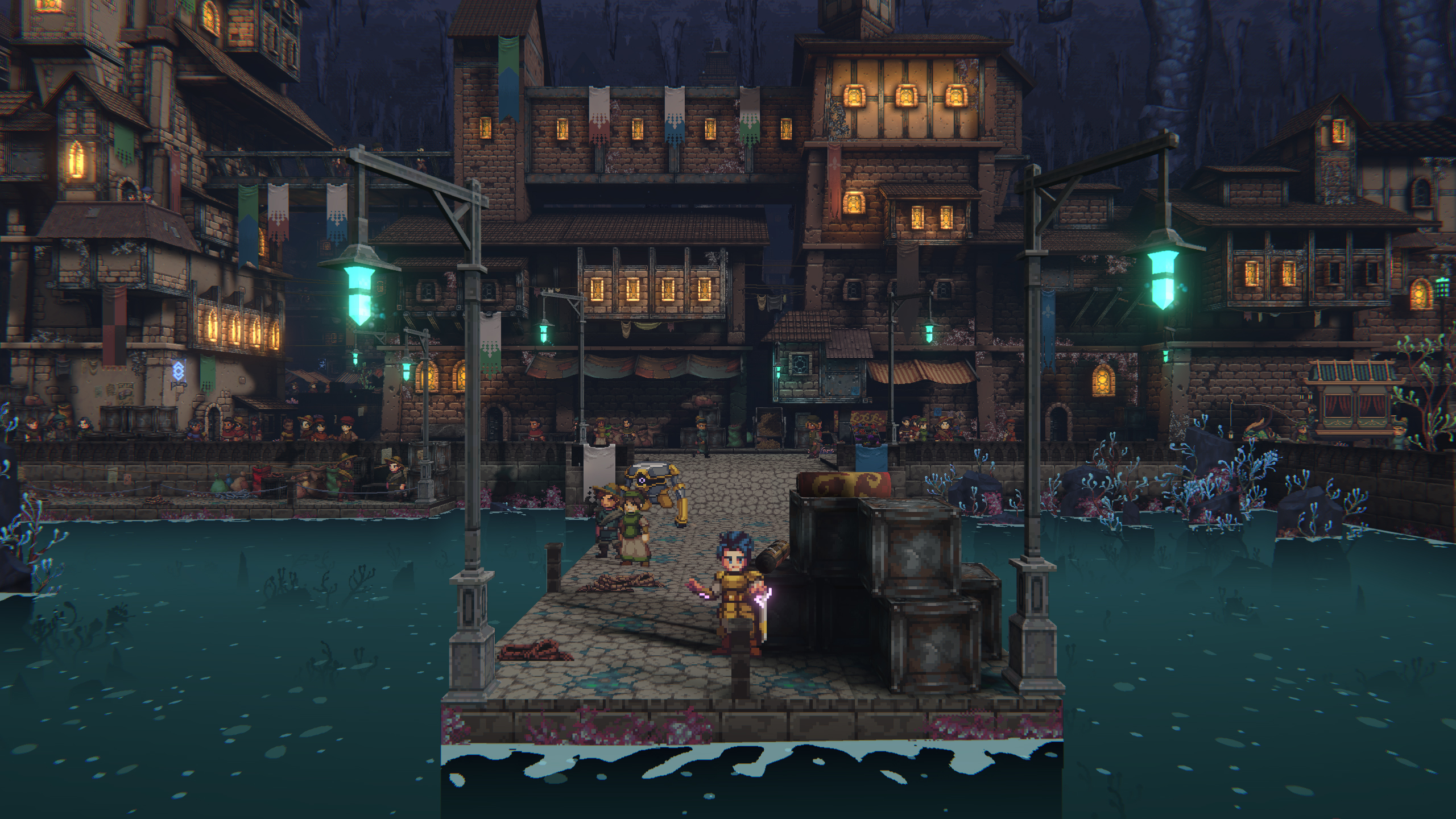
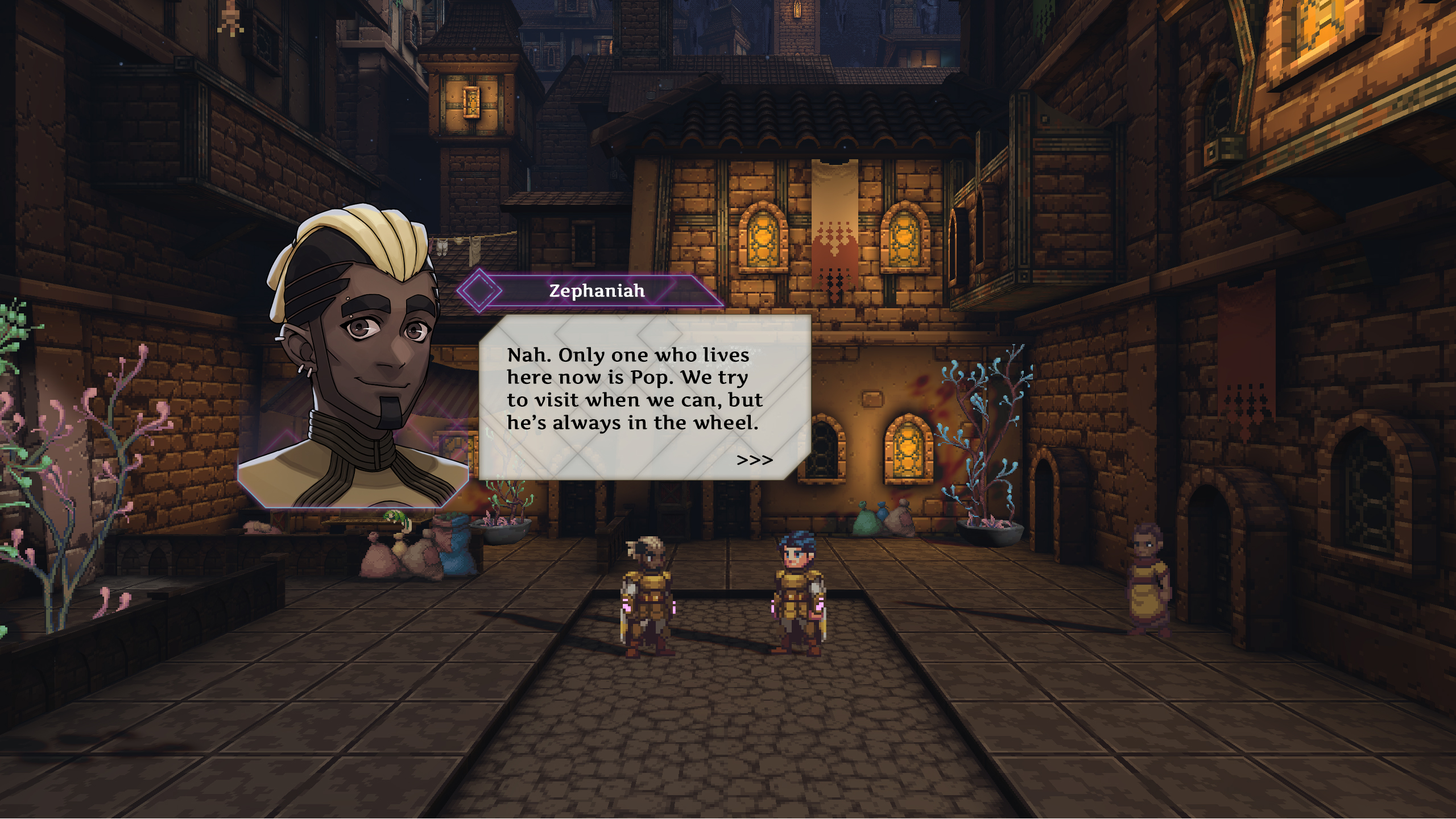
What's a little unexpected, though, is that Antioch is overlapped by a parallel dimension called Erebus that players can freely jump between at certain points in the world. Using a device called a Prayer Wheel, which Łojewski likens to jacking into The Matrix, players are teleported from the underground to a beautiful spirit world full of lush forests and open sky.
What's cool is how Erebus and Antioch play into dungeons and exploration. If an area is locked off in Antioch, players might be able to enter Erebus to find a way to bypass the obstacle. If you're at all familiar with The Legend of Zelda: Oracle of Ages (or Oracle of Seasons) for the GameBoy, it sounds similar. You jump between realities to bypass or find solutions
During my interview with Łojewski, we discussed tons of these features and ideas that are shaping SacriFire into something unique. And, coupled with its gorgeous 3D pixel art and the fact that Motoi Sakuraba is helping write the music, there's a lot to be excited about.
The only problem is that SacriFire is still very early in development and is using Kickstarter for funding. It's something that Łojewski is very aware of—not only because his last game, Regalia, was a Kickstarter success story but because he knows how much it sucks when Kickstarters don't deliver. "I backed two of the biggest JRPG implosions on Kickstarter and was burned by that," he says. "I will say that, with Regalia, which was a JRPG inspired game, we delivered that. Everything that was promised was done. And this time we're not a studio with no track record. We've made two games."
"I would dare to call myself a moderately safe pick in terms of a Kickstarter project," Łojewski laughs.
SacriFire's Kickstarter campaign is now live, and its project page shares more about the finer details Pixelated Milk is working on, like weapon upgrading and its companion system. Though it's too early to say for sure, Łojewski says the team is aiming for a late 2022 release.
With over 7 years of experience with in-depth feature reporting, Steven's mission is to chronicle the fascinating ways that games intersect our lives. Whether it's colossal in-game wars in an MMO, or long-haul truckers who turn to games to protect them from the loneliness of the open road, Steven tries to unearth PC gaming's greatest untold stories. His love of PC gaming started extremely early. Without money to spend, he spent an entire day watching the progress bar on a 25mb download of the Heroes of Might and Magic 2 demo that he then played for at least a hundred hours. It was a good demo.


